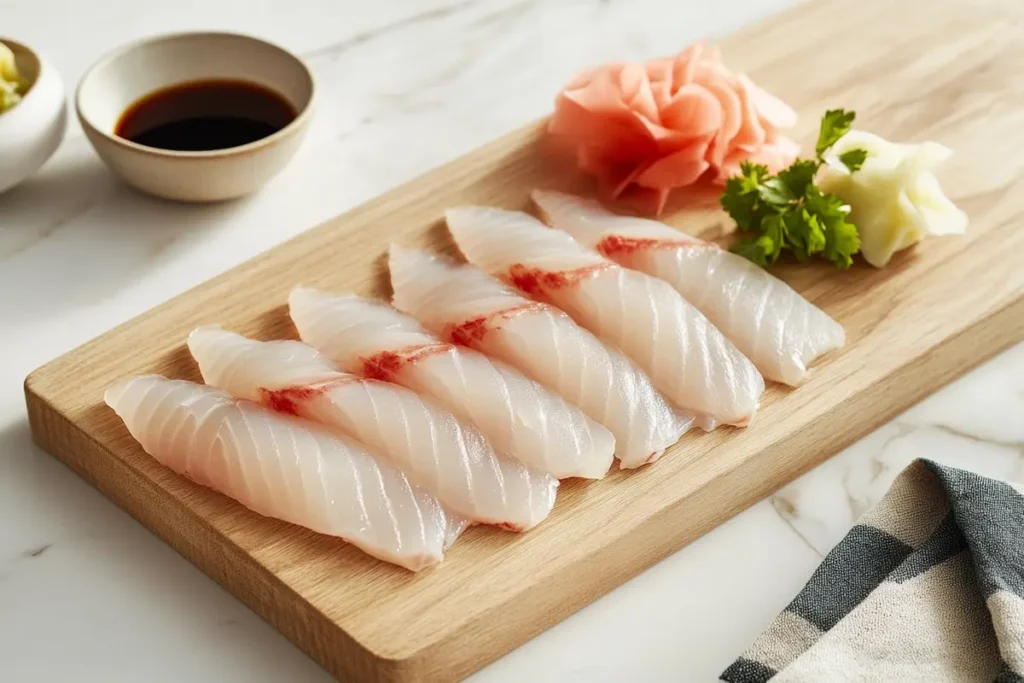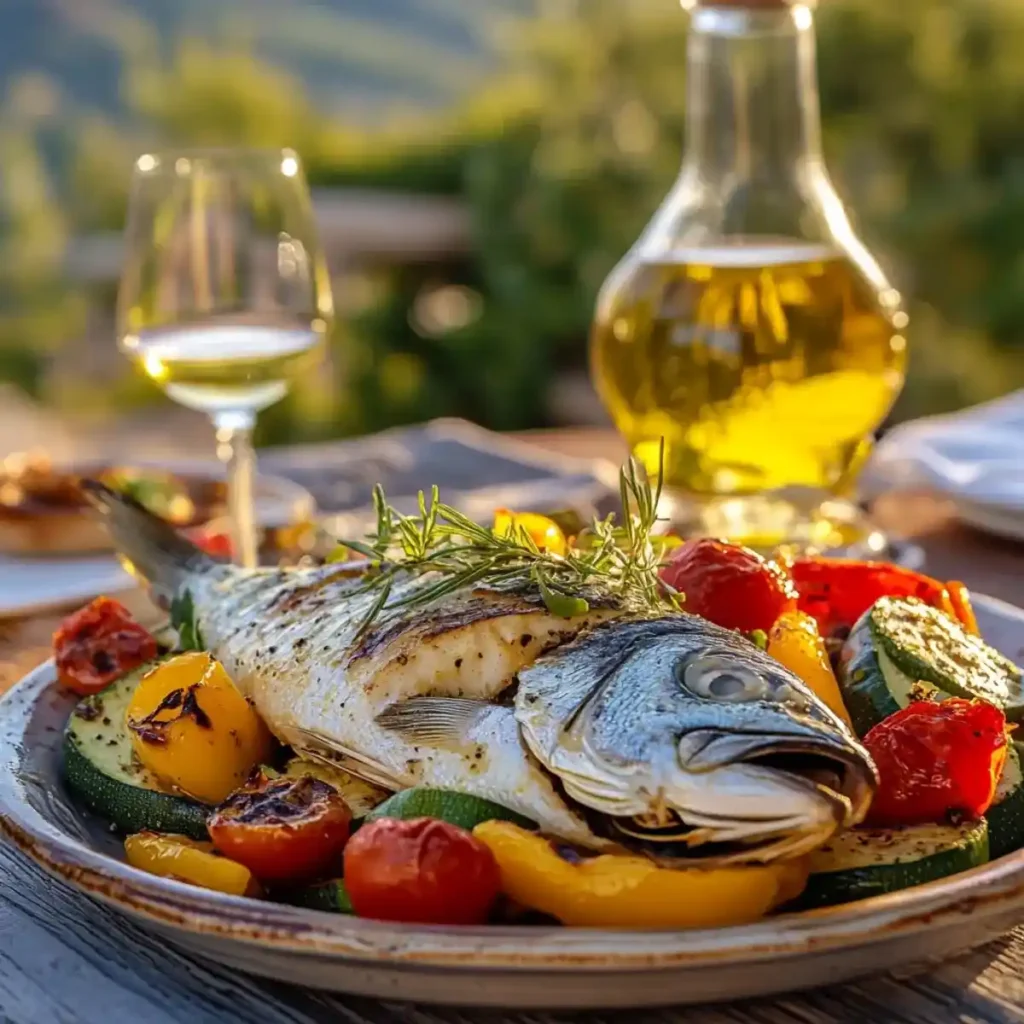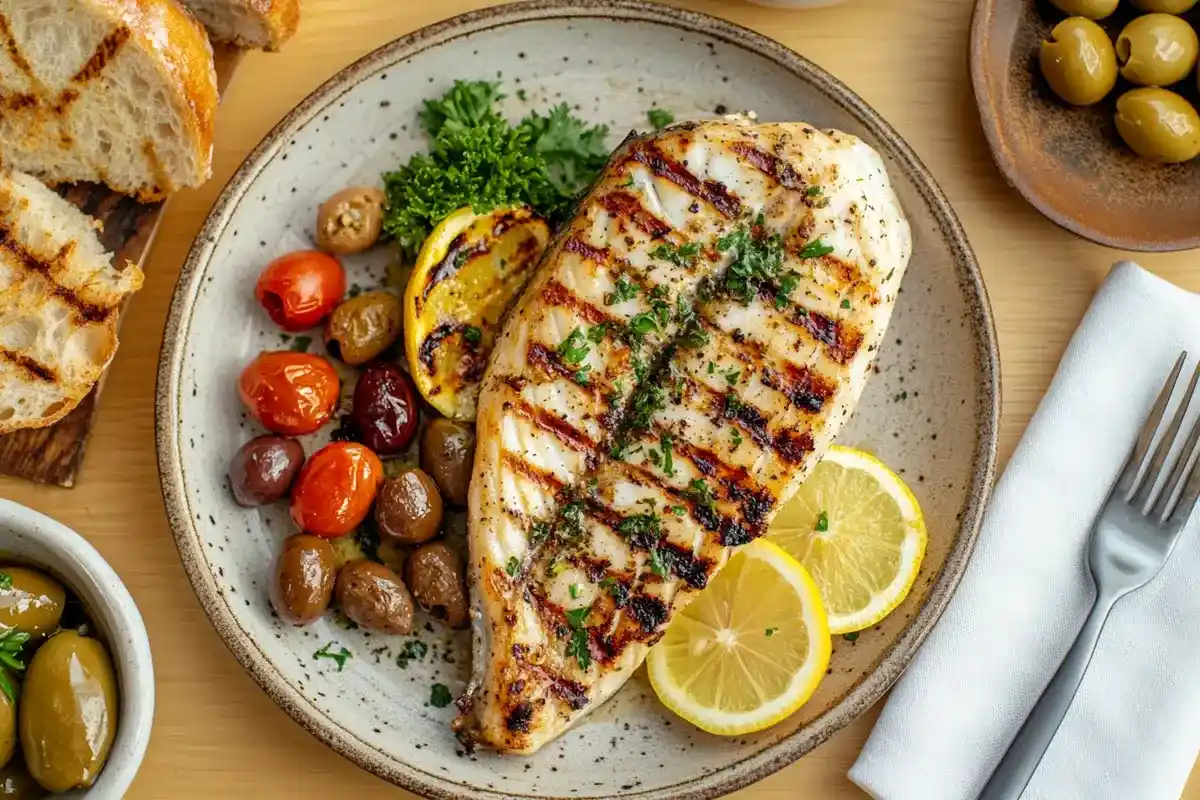introduction
When it comes to choosing seafood, the question often arises: Is dorade a good fish to eat? This Mediterranean delight, also known as sea bream, orata, or gilthead, is cherished for its mild flavor, versatility in recipes, and nutritious benefits. From its origins to its unique taste and how it stacks up against other fish, this article dives into everything you need to know about dorade.
What is Dorade?
Overview of Dorade
Dorade, a saltwater fish native to the Mediterranean Sea, is part of the Sparidae family. This silvery, medium-sized fish is renowned for its tender white flesh and slightly meaty flavor. Dorade has made its way into cuisines worldwide, particularly in Mediterranean dishes, where its umami-rich profile complements a variety of ingredients.
Although originally found in the Mediterranean and Atlantic Ocean, overfishing has led to the rise of farmed dorade. Today, most dorade available in markets is farmed in countries like France, Greece, and Spain.
Common Names and Types
Dorade goes by many names depending on where it’s found. In English, it’s often called sea bream or gilthead. In Spanish-speaking countries, it’s referred to as dorada, and Italians call it orata. Despite the name variations, all refer to the same fish.
There are also different types of dorade, including gray, pink, marble, and royal varieties. Each type offers a subtle difference in taste and texture, though they all share the fish’s hallmark mild flavor and firm flesh.
Dorade’s Culinary and Cultural Importance
In Mediterranean cultures, dorade is a staple. It features prominently in dishes like bouillabaisse, a classic French seafood stew, and is often grilled whole with simple seasonings. Its versatility and rich cultural heritage make it a favorite for chefs and home cooks alike.
Dorade’s rise in global popularity is not without reason. Its adaptability to various cooking methods and recipes ensures that it holds its own in any culinary tradition.
Nutritional Value of Dorade
Macro and Micronutrient Breakdown
When considering the question Is dorade a good fish to eat?, one crucial factor is its nutritional content. Dorade is a powerhouse of nutrients, making it an excellent choice for health-conscious eaters. Rich in lean protein, it helps build and repair tissues while supporting muscle growth.
This fish is also loaded with essential vitamins and minerals. For instance, it’s a great source of vitamin B12, which supports energy production and neurological health. Additionally, dorade contains significant amounts of phosphorus, crucial for strong bones and teeth, and selenium, a potent antioxidant.
Health Benefits of Eating Dorade
The omega-3 fatty acids in dorade offer significant heart health benefits, reducing inflammation and supporting proper brain function. Its low calorie and fat content make it a smart option for those aiming to maintain or lose weight.
Moreover, eating dorade regularly may improve skin health and enhance immunity due to its rich nutrient profile. The fish is also low in mercury, making it safer for frequent consumption compared to some other seafood options.
For tips on cooking dorade, check out Zinas recipe for Dorade Fish.
How Does Dorade Taste?
Flavor Profile
The flavor of dorade is a standout reason why it’s so beloved. It offers a mild, clean taste with just a hint of sweetness, making it appealing to those who may not enjoy overly “fishy” flavors. Its firm, slightly fatty flesh holds its structure well during cooking, allowing it to soak up the flavors of marinades and seasonings beautifully.
Comparison to Other Fish
Dorade often gets compared to similar fish like red snapper and sea bass. While all three share a mild taste and versatile texture, dorade has a slightly richer and meatier quality, thanks to the thin layer of fat beneath its skin. Red snapper leans sweeter, while sea bass has a more buttery flavor. These distinctions make dorade a unique yet comparable choice for a variety of recipes.
If you’re wondering what dishes to pair it with, explore the differences between Dorade vs. Sea Bass to make an informed choice for your meal planning.
Cooking Methods for Dorade
Grilling and Baking Techniques
When it comes to cooking dorade, simplicity is key. Grilling and baking are two of the most popular methods to bring out its natural flavors.
To grill dorade, clean the fish thoroughly and season it with salt, pepper, and olive oil. Stuff the cavity with fresh herbs like thyme or parsley, along with lemon slices for added zest. Place it on a hot grill, cooking each side for about 5–7 minutes, until the skin turns golden and crispy. The slightly fatty flesh ensures the fish remains moist and flavorful.
For baking, wrap the fish in foil along with aromatic ingredients like garlic, onions, and fennel. This method seals in the juices, making the fish tender and delicious. Bake at 375°F (190°C) for around 25–30 minutes, depending on the fish’s size.
Alternative Recipes

If you prefer experimenting with recipes, dorade is versatile enough for dishes like sushi or crudo. Thinly slice raw dorade and drizzle it with citrus juice, olive oil, and sea salt for a refreshing crudo dish. Alternatively, use it as the star ingredient in a classic French bouillabaisse or a hearty fish curry.
For more tips and recipe ideas, you might enjoy reading Dorade Fish: Enjoy the Delicious Taste and Versatility.
Tips for Deboning and Serving
Deboning dorade can be tricky due to its many fine bones. A larger fish is easier to handle if you plan to serve it whole. Gently remove the skin and use a fork to separate the flesh from the bones before serving.
Environmental and Sustainability Considerations
Wild-Caught vs. Farmed Dorade
When asking Is dorade a good fish to eat?, sustainability is an important consideration. Overfishing has led to a decline in wild dorade populations, making farmed dorade a more common option. Farmed dorade is widely available and ensures consistent quality and availability without significantly impacting marine ecosystems.
However, there are differences in taste and texture between wild-caught and farmed fish. Wild dorade often has a slightly more robust flavor due to its natural diet, while farmed versions tend to be milder.
Sustainability Certifications
To make an eco-friendly choice, look for dorade certified by organizations like the Marine Stewardship Council (MSC) or Aquaculture Stewardship Council (ASC). These certifications indicate sustainable farming or fishing practices, ensuring that the fish you consume is both delicious and responsibly sourced.
For more insights on selecting sustainable seafood, check out Zinas tips on sustainable fish recipes.
Where to Buy and Store Dorade
Availability in Markets
If you’re wondering, Is dorade a good fish to eat?, the next step is knowing where to find it. Dorade can often be found at specialty fishmongers, Mediterranean markets, or higher-end grocery stores. In some regions, it may be labeled as sea bream or gilthead, so keep an eye out for these alternate names.
Fresh dorade is ideal, but frozen options are widely available and maintain much of the fish’s flavor and texture. When buying fresh, look for bright eyes, shiny scales, and a mild ocean-like smell—these are signs of quality and freshness.
Storage Tips
Proper storage is essential to preserve the delicate flavor of dorade. If you’re using fresh fish, store it in the coldest part of your refrigerator and cook it within one to two days. For longer storage, wrap it tightly and freeze it, ensuring it remains safe and tasty for weeks.
Leftover cooked dorade can be refrigerated for up to two days. If incorporated into a stew or curry, the flavors often improve the next day. Just make sure to reheat thoroughly.
Cultural Significance of Dorade

Dorade in Mediterranean Cuisine
Dorade holds a special place in Mediterranean kitchens, where it has been enjoyed for centuries. This fish is a staple in dishes like French bouillabaisse, Greek grilled fish platters, and Italian orata al forno. Its mild, slightly sweet flavor makes it a versatile ingredient that complements the robust flavors of Mediterranean spices and herbs.
In France, dorade is often served whole, grilled to perfection, and accompanied by fresh vegetables or a drizzle of olive oil. Meanwhile, in Greece, it’s common to find it stuffed with lemons and herbs, then roasted until flaky. These traditional recipes highlight the fish’s adaptability and cultural importance.
Global Popularity of Dorade
Although it’s deeply rooted in Mediterranean cuisine, dorade’s popularity has spread worldwide. From fine dining restaurants to home kitchens, chefs appreciate its versatility and ease of preparation. The fish’s ability to adapt to different cooking techniques, combined with its mild yet satisfying flavor, has helped it become a favorite in cuisines far beyond its native waters.
With its cultural and culinary appeal, it’s no wonder many people ask, Is dorade a good fish to eat? The answer is a resounding yes, thanks to its rich history and delicious possibilities.
Final Thoughts on Dorade
Why Dorade Deserves a Spot on Your Table
After exploring its nutritional value, taste, sustainability, and cultural significance, it’s clear why dorade is such a popular choice. Its mild flavor, meaty texture, and versatility make it an excellent option for both simple meals and sophisticated dishes. Whether grilled, baked, or transformed into sushi, dorade delivers a dining experience that’s hard to beat.
Answering the Question: Is Dorade a Good Fish to Eat?
Ultimately, Is dorade a good fish to eat? Absolutely! It’s healthy, sustainable, and incredibly tasty. Its ability to fit into various cuisines while providing essential nutrients makes it a top choice for seafood lovers.
For anyone looking to add a new fish to their diet or experiment with Mediterranean-inspired recipes, dorade is a standout option. Be sure to pair it with your favorite side dishes, and don’t hesitate to explore its endless culinary possibilities.
FAQs About Dorade
What Are the Health Benefits of Dorade?
Dorade is rich in protein, omega-3 fatty acids, and essential nutrients like selenium and phosphorus. These components support heart health, boost brain function, and strengthen bones, making dorade a fantastic addition to any diet.
How Do I Cook Dorade at Home?
Cooking dorade at home is simple and rewarding. Popular methods include grilling, baking, and poaching. Its firm flesh makes it perfect for stews, curries, or even sushi dishes like crudo.
Is Dorade a Sustainable Fish to Eat?
Sustainability is key when choosing seafood. Farmed dorade is widely available and a more sustainable choice compared to wild-caught options, which are often overfished. Look for certifications like MSC or ASC to ensure responsible sourcing.
Can I Substitute Dorade for Other Fish in Recipes?
Yes! Dorade’s mild, versatile flavor makes it an excellent substitute for fish like red snapper, sea bass, or even cod. It holds up well to various cooking methods and pairs beautifully with a range of seasonings.

